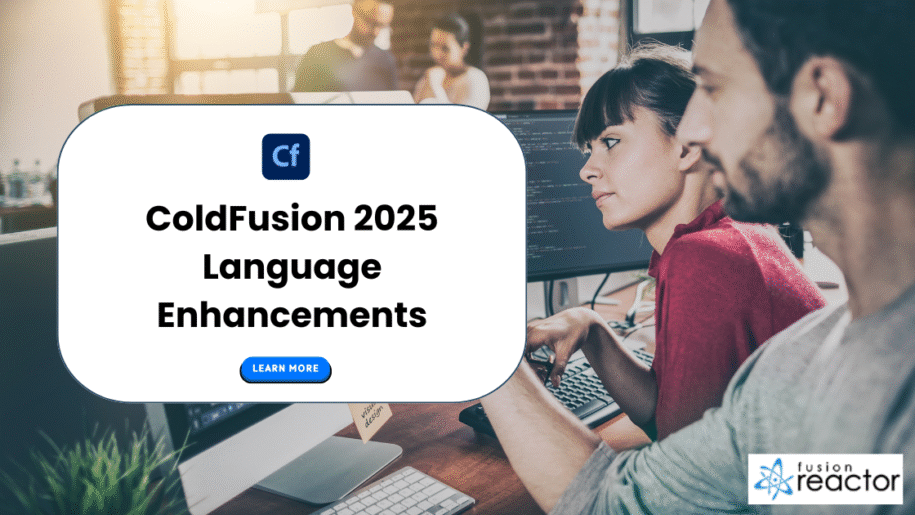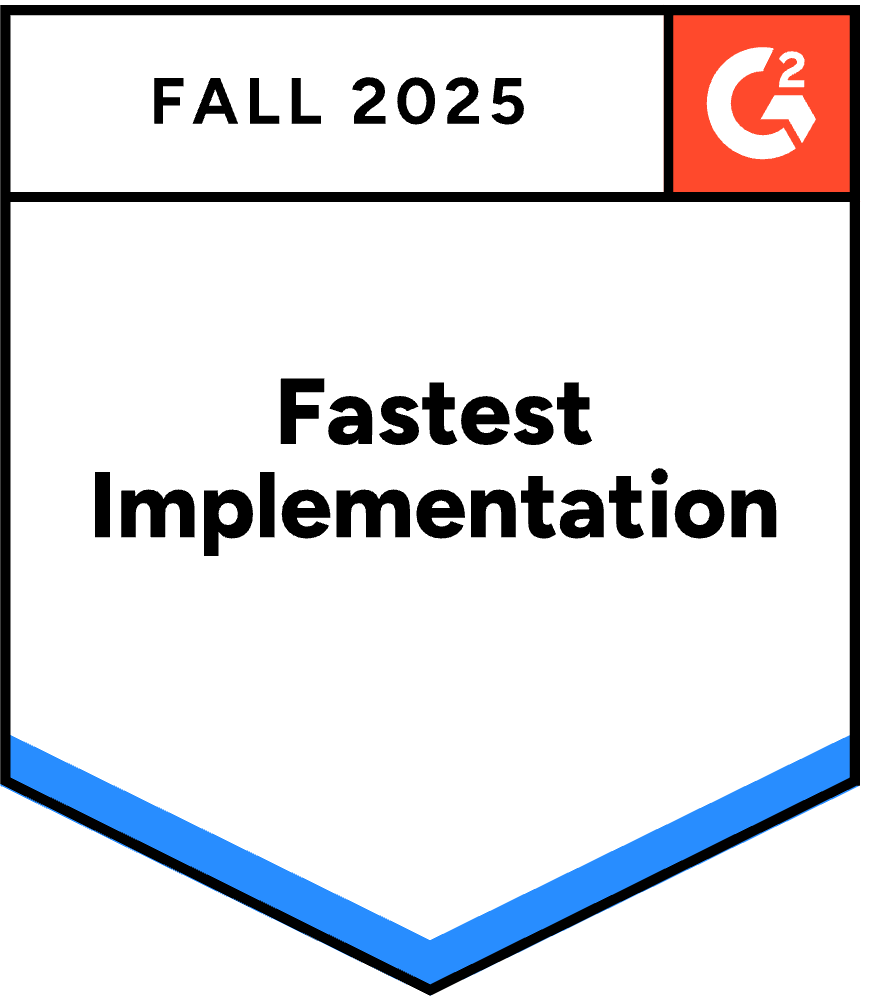Adobe ColdFusion has entered a new era with its 2025 release, significantly changing licensing and development features. As Adobe transitions to a subscription-only model, developers also gain access to powerful new language capabilities. Let’s explore these changes and how they might impact your ColdFusion projects.
Adobe’s New Subscription Licensing Model
ColdFusion 2025 marks the end of perpetual licenses and serial numbers. Instead, Adobe has moved to a subscription-only model managed through the Adobe Admin Console. This transition brings several notable changes:
- Java 21 support for improved performance and security
- Deployment on Tomcat 10.1 for better compatibility with modern web standards
- Simplified license deployment and management through the Adobe Admin Console
While Adobe only offers ColdFusion 2025 under subscription licensing, many organizations still need access to earlier versions like CF2018, CF2021, or CF2023. The good news is that purchasing a ColdFusion 2025 subscription entitles you to backward licensing access to these earlier versions.
This flexibility is crucial for organizations with legacy applications that are not ready to migrate immediately. With the right licensing partner, you can maintain compliance while running the version that best suits your environment.
Language Enhancements in ColdFusion 2025
Beyond licensing changes, ColdFusion 2025 introduces several language enhancements designed to boost developer productivity. Let’s explore some of these exciting new features:
1. Enhanced Query of Query Capabilities
ColdFusion’s Query of Query functionality now supports additional operators, making it even more powerful for cross-database operations:
Modulus Operator (%)
cfml
<!--- Create a sample inventory query --->
<cfset inventoryData = QueryNew(
'productID,stockLevel,reorderPoint',
'integer,integer,integer',
[
[1001, 157, 50],
[1002, 43, 30],
[1003, 212, 75],
[1004, 18, 25]
]
) >
<!--- Find products where stock level divided by reorder point has remainder < 2 --->
<cfquery name="lowStockProducts" dbtype="query">
SELECT
productID,
stockLevel,
reorderPoint,
stockLevel % reorderPoint AS stockModulus
FROM inventoryData
WHERE (stockLevel % reorderPoint) < 2
ORDER BY stockModulus
</cfquery>
<!--- Display results --->
<cfoutput query="lowStockProducts">
<p>Product ##productID## needs attention: Stock level (#stockLevel#) is nearly
a multiple of reorder point (#reorderPoint#) with remainder of just #stockModulus#</p>
</cfoutput>
Bitwise Operations
cfml
<!--- Create a permissions query representing user access levels --->
<cfset userPermissions = QueryNew(
'userID,username,baseAccess,roleAccess',
'integer,varchar,integer,integer',
[
[101, 'admin_user', 15, 240], <!-- 15 = 1111 binary, 240 = 11110000 binary -->
[102, 'editor_role', 7, 112], <!-- 7 = 0111 binary, 112 = 01110000 binary -->
[103, 'viewer_only', 1, 16] <!-- 1 = 0001 binary, 16 = 00010000 binary -->
]
) >
<!--- Use bitwise operations to calculate effective permissions --->
<cfquery name="effectivePermissions" dbtype="query">
SELECT
userID,
username,
baseAccess | roleAccess AS combinedAccess,
baseAccess & roleAccess AS sharedAccess,
baseAccess ^ roleAccess AS uniqueAccess,
roleAccess << 1 AS escalatedAccess,
baseAccess >> 1 AS reducedAccess
FROM userPermissions
</cfquery>
<!--- Output permissions analysis --->
<cfoutput query="effectivePermissions">
<h4>User: #username# (ID: #userID#)</h4>
<ul>
<li>Combined permissions (OR): #combinedAccess#</li>
<li>Shared permissions (AND): #sharedAccess#</li>
<li>Unique permissions (XOR): #uniqueAccess#</li>
<li>Escalated role permissions (Left Shift): #escalatedAccess#</li>
<li>Reduced base permissions (Right Shift): #reducedAccess#</li>
</ul>
</cfoutput>
2. Multi-Assign Operators
The new multi-assign operators allow you to both operate on a variable and reassign its value in a single step:
cfml
<cfscript>
// E-commerce cart scenario using multi-assign operators
cartTotal = 125.75;
shippingCost = 12.50;
taxRate = 0.08;
discountPercent = 0.15;
writeOutput("<h3>Shopping Cart Calculation Using Multi-Assign Operators</h3>");
// Add shipping to cart total
writeOutput("Initial cart total: $#numberFormat(cartTotal, '999.99')#<br>");
writeOutput("Adding shipping cost: $#numberFormat(shippingCost, '999.99')#<br>");
result = (cartTotal += shippingCost);
writeOutput("New total with shipping: $#numberFormat(cartTotal, '999.99')#<br><br>");
// Apply percentage discount
writeOutput("Applying #numberFormat(discountPercent*100, '999.99')#% discount<br>");
discountAmount = (cartTotal *= (1 - discountPercent));
writeOutput("Discounted total: $#numberFormat(cartTotal, '999.99')#<br><br>");
// Add tax
writeOutput("Adding #numberFormat(taxRate*100, '999.99')#% sales tax<br>");
finalTotal = (cartTotal *= (1 + taxRate));
writeOutput("Final total with tax: $#numberFormat(cartTotal, '999.99')#<br><br>");
// Customer loyalty points calculation (1 point per $10 spent)
loyaltyPoints = 0;
writeOutput("Customer starts with #loyaltyPoints# loyalty points<br>");
// Add loyalty points based on spending
pointsPerDollar = 0.1; // 1 point per $10
earnedPoints = (loyaltyPoints += (cartTotal * pointsPerDollar));
// Round down to whole number
loyaltyPoints = int(loyaltyPoints);
writeOutput("Customer earned #loyaltyPoints# loyalty points from this purchase<br>");
// Apply points discount on next purchase (if enough points)
pointsThreshold = 50;
futureDiscount = 0;
if (loyaltyPoints >= pointsThreshold) {
// Calculate discount and subtract points
(futureDiscount += 5); // $5 discount
(loyaltyPoints -= pointsThreshold);
writeOutput("Customer qualifies for a $#futureDiscount# discount on next purchase<br>");
writeOutput("Remaining loyalty points: #loyaltyPoints#<br>");
} else {
pointsNeeded = pointsThreshold - loyaltyPoints;
writeOutput("Customer needs #pointsNeeded# more points for a discount<br>");
}
</cfscript>
3. Function Parameters Destructuring
ColdFusion 2025 completes the destructuring support by adding it to function parameters, making code more concise and readable:
cfml
<cfscript>
// Weather API response simulation
weatherData = {
location: {
city: "San Francisco",
region: "California",
country: "United States",
lat: 37.7749,
lon: -122.4194,
timezone: "America/Los_Angeles"
},
current: {
temp_c: 18.5,
temp_f: 65.3,
condition: {
text: "Partly cloudy",
icon: "//cdn.weatherapi.com/weather/64x64/day/116.png",
code: 1003
},
wind_mph: 12.5,
wind_dir: "WSW",
humidity: 72,
uv: 4.0
},
forecast: {
days: [
{
date: "2025-05-21",
max_temp_c: 22.4,
min_temp_c: 15.8,
chance_of_rain: 20
},
{
date: "2025-05-22",
max_temp_c: 24.1,
min_temp_c: 16.2,
chance_of_rain: 10
}
]
}
};
// Without destructuring - more verbose
function displayWeatherOld(weatherData) {
writeOutput("<h3>Weather for #weatherData.location.city#, #weatherData.location.region#</h3>");
writeOutput("<p>Current temperature: #weatherData.current.temp_c#°C / #weatherData.current.temp_f#°F</p>");
writeOutput("<p>Conditions: #weatherData.current.condition.text#</p>");
writeOutput("<p>Wind: #weatherData.current.wind_mph# mph from the #weatherData.current.wind_dir#</p>");
if (structKeyExists(weatherData, "forecast") && arrayLen(weatherData.forecast.days) > 0) {
writeOutput("<p>Tomorrow's high: #weatherData.forecast.days[2].max_temp_c#°C</p>");
}
}
// With destructuring - cleaner and with default values
function displayWeather({
location: {
city,
region,
country,
timezone = "UTC"
},
current: {
temp_c,
temp_f,
condition: {
text = "Unknown",
icon = ""
},
wind_mph = 0,
wind_dir = "N",
humidity = 0,
uv = 0
},
forecast: {
days = []
} = {}
}) {
writeOutput("<div class='weather-card'>");
writeOutput("<h3>#city#, #region#, #country#</h3>");
writeOutput("<p><strong>#text#</strong> - Temperature: #temp_c#°C / #temp_f#°F</p>");
writeOutput("<p>Humidity: #humidity#% | UV Index: #uv# | Wind: #wind_mph# mph #wind_dir#</p>");
if (arrayLen(days) > 0) {
writeOutput("<h4>Forecast:</h4><ul>");
for (day in days) {
writeOutput("<li>#day.date# - High: #day.max_temp_c#°C, Low: #day.min_temp_c#°C,
Rain chance: #day.chance_of_rain#%</li>");
}
writeOutput("</ul>");
}
writeOutput("</div>");
}
// Example of using rest parameter with destructuring
function summarizeLocation({city, region, ...otherLocationData}) {
writeOutput("<h4>Location Summary</h4>");
writeOutput("<p>Primary: #city#, #region#</p>");
// Display other location data we extracted
writeOutput("<p>Additional location data:</p><ul>");
for (key in otherLocationData) {
writeOutput("<li>#key#: #otherLocationData[key]#</li>");
}
writeOutput("</ul>");
}
// Call our functions with destructuring
displayWeather(weatherData);
summarizeLocation(weatherData.location);
// Function to get forecast summary using nested destructuring
function getForecastSummary({
location: {city},
forecast: {days}
}) {
// Extract data from the first two days in the array
dayOne = days[1];
dayTwo = days[2];
return {
"location": city,
"today": {
"date": dayOne.date,
"high": dayOne.max_temp_c,
"rainChance": dayOne.chance_of_rain
},
"tomorrow": {
"date": dayTwo.date,
"high": dayTwo.max_temp_c,
"rainChance": dayTwo.chance_of_rain
}
};
}
// Get forecast summary
forecastSummary = getForecastSummary(weatherData);
writeDump(var=forecastSummary, label="Forecast Summary");
</cfscript>
4. Enhanced Query Caching
ColdFusion 2025 introduces a new cacheMaxIdleTime attribute for the <cfquery> tag, improving cache efficiency:
cfml
<!--- Configuration for application-wide cache settings --->
<cfset application.cacheConfig = {
startTime: CreateOdbcDateTime(dateFormat(now(), 'yyyy-mm-dd') & ' 00:00:00'),
reportRefreshWindow: createTimespan(0, 1, 0, 0), // 1 hour
maxIdleWindow: createTimespan(0, 0, 30, 0) // 30 minutes
} />
<!--- Dashboard query that benefits from intelligent caching --->
<cfquery name="dashboardMetrics"
datasource="analytics"
cachemaxidletime="#application.cacheConfig.maxIdleWindow#"
cachedafter="#application.cacheConfig.startTime#"
cachedwithin="#application.cacheConfig.reportRefreshWindow#">
SELECT
department,
SUM(CASE WHEN transaction_type = 'sale' THEN amount ELSE 0 END) AS total_sales,
SUM(CASE WHEN transaction_type = 'refund' THEN amount ELSE 0 END) AS total_refunds,
COUNT(DISTINCT customer_id) AS unique_customers,
AVG(order_value) AS average_order
FROM
daily_transactions
WHERE
transaction_date BETWEEN CURRENT_DATE - 30 AND CURRENT_DATE
GROUP BY
department
ORDER BY
total_sales DESC
</cfquery>
<cfoutput>
<div class="dashboard-info">
<h3>Department Performance Dashboard</h3>
<p>Data as of: #timeFormat(now(), 'h:mm:ss tt')#</p>
<p>Cache behavior:</p>
<ul>
<li>Cache will refresh completely every hour (cachedwithin)</li>
<li>Cache starts after midnight today (cachedafter)</li>
<li>Cache extends for 30 minutes after each access (cachemaxidletime)</li>
</ul>
<p>During periods of high traffic, this intelligent caching can drastically
reduce database load while ensuring reports remain current.</p>
</div>
<table class="dashboard-table">
<tr>
<th>Department</th>
<th>Total Sales</th>
<th>Total Refunds</th>
<th>Unique Customers</th>
<th>Average Order</th>
</tr>
<cfloop query="dashboardMetrics">
<tr>
<td>#department#</td>
<td>$#numberFormat(total_sales, '999,999.99')#</td>
<td>$#numberFormat(total_refunds, '999,999.99')#</td>
<td>#unique_customers#</td>
<td>$#numberFormat(average_order, '999.99')#</td>
</tr>
</cfloop>
</table>
</cfoutput>
Unlike cachedwithin, which caches for a fixed time regardless of how often the query is accessed, cacheMaxIdleTime resets the cache timer based on the last request, potentially saving resources for queries that are accessed frequently during active periods but can expire during quiet periods.
5. Thread Functionality Enhancements
With JDK 21 no longer supporting thread stopping, ColdFusion 2025 implements graceful thread termination via interrupts:
cfml
<cfscript>
// Implementing a data processing task with graceful interruption
// Create a log function to track thread activities with timestamps
function logActivity(message) {
writeOutput("#timeFormat(now(), 'HH:mm:ss.SSS')# - #message#<br>");
}
// Initialize processing parameters
batchSize = 50;
maxProcessingTime = 10000; // 10 seconds
threadName = "dataProcessor_#createUUID()#";
// Start the batch processing thread
logActivity("Starting batch processing thread (#threadName#)");
thread action="run" name="#threadName#" {
// Variables for this thread
local.processedRecords = 0;
local.startTime = getTickCount();
local.errorCount = 0;
try {
// Processing loop with interrupt checking
while(!isThreadInterrupted(threadName)) {
// Simulate batch processing work
for (local.i = 1; local.i <= batchSize; local.i++) {
// Check for interrupt at batch item level for responsiveness
if (isThreadInterrupted(threadName)) {
thread.interruptedDuringBatch = true;
break;
}
// Simulate processing a record (with occasional errors)
try {
// Simulate work
sleep(25); // 25ms per record
// Simulate occasional failure
if (randRange(1, 100) > 95) {
throw(type="ProcessingException", message="Simulated processing error");
}
// Record processed successfully
local.processedRecords++;
}
catch (any e) {
local.errorCount++;
writeOutput("Error processing record: #e.message#<br>");
// Continue processing despite errors
}
}
// Update status after each batch
thread.status = {
"processedRecords": local.processedRecords,
"errorCount": local.errorCount,
"elapsedTime": getTickCount() - local.startTime,
"lastBatchTime": now()
};
// Check if we've exceeded our max processing time
if (getTickCount() - local.startTime > maxProcessingTime) {
writeOutput("Maximum processing time reached. Self-interrupting.<br>");
interruptThread(threadName);
}
// Yield briefly to allow other processes to run
sleep(10);
}
}
catch (any e) {
// Handle unexpected errors
writeOutput("Thread encountered an error: #e.message#<br>");
thread.fatalError = e;
}
finally {
// Always perform cleanup operations when thread ends
thread.finalStatistics = {
"totalRecords": local.processedRecords,
"totalErrors": local.errorCount,
"totalTime": getTickCount() - local.startTime,
"averageRecordTime": (local.processedRecords > 0) ?
(getTickCount() - local.startTime) / local.processedRecords : 0,
"completionTime": now()
};
writeOutput("Thread #threadName# is exiting gracefully after processing #local.processedRecords# records.<br>");
writeOutput("Cleanup operations completed successfully.<br>");
}
}
// Let the thread start and process some data
sleep(2000);
// Check thread status
logActivity("Thread status after 2 seconds: #evaluate(threadName).STATUS#");
// Interrupt the thread
logActivity("Sending interrupt signal to thread");
interruptThread(threadName);
logActivity("Interrupt signal sent. Thread interrupted status: #isThreadInterrupted(threadName)#");
// Wait for the thread to complete with a timeout
thread action="join" name="#threadName#" timeout="5000" {
logActivity("Thread join operation completed");
}
// Display final thread information
logActivity("Final thread status: #evaluate(threadName).STATUS#");
// If available, show the thread's statistics
if (structKeyExists(evaluate(threadName), "finalStatistics")) {
finalStats = evaluate(threadName).finalStatistics;
writeOutput("<h4>Processing Summary:</h4>");
writeOutput("<ul>");
writeOutput("<li>Records processed: #finalStats.totalRecords#</li>");
writeOutput("<li>Errors encountered: #finalStats.totalErrors#</li>");
writeOutput("<li>Total processing time: #finalStats.totalTime# ms</li>");
writeOutput("<li>Average time per record: #numberFormat(finalStats.averageRecordTime, '999.99')# ms</li>");
writeOutput("</ul>");
}
</cfscript>
This example demonstrates how to implement interruptible threads in ColdFusion 2025, featuring:
- Graceful interrupt handling with proper cleanup
- Status tracking and reporting
- Error handling that preserves thread stability
- Self-monitoring for timeout conditions
- Structured final statistics reporting
Making the Transition
Whether you’re ready to migrate to ColdFusion 2025 or need to maintain compatibility with earlier versions, understanding these licensing changes and new features is essential for planning your ColdFusion strategy.
For complex licensing scenarios or custom deployment needs, consider consulting with an Adobe-authorized licensing partner who can help you navigate the new subscription model while maintaining backward compatibility.










